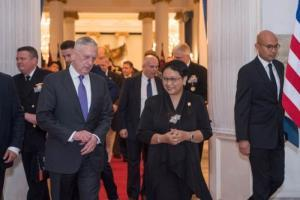SEC. MATTIS:Yes, good question. What we're doing is as we -- as it goes -- as we break down ISIS -- and there's still hard fighting going on, very hard fighting. We are losing people, ISIS (inaudible) location is counterattacking. It is hard fighting. But as this -- as we uncover territory from ISIS control, you obviously have to set up some kind of local authorities.
I mean, it's not like we've cleansed the area of every ISIS fighter with an AK-47 or a VBIED, a vehicle-borne IED at his disposal. So you have to put those folks together. Those are local security forces, made up of locals. So we're training them, we're trying to use international policing standards in order to make certain they're trained properly, and we're equipping them -- I would put -- along the lines of a heavily armed police force. Obviously you don't want somebody with a sidearm only dealing with ISIS. OK? It's not that kind of a security mission. So they're going to be armed. I would say at a minimum, rifles and machine guns, that sort of thing.
But these are locals. And these -- this area that we're talking about right now is heavily Sunni Arab, so you're going to see a lot of Sunni Arabs, obviously in the -- in the police force. But there's other -- there's other ethnic minorities and other people mixed in there. It's not like it's all one thing.
So we're trying to put together a force that we don't get a return of ISIS or we don't -- you know, we've done this before, where we took down Al-Qaeda in Iraq and you saw what happened when we all took our -- our attention off it, and out came ISIS. So what we're going to do is leave local security forces. But the solution to the area goes to Geneva.
The U.N.-brokered Staffan de Mistura Staffa De Mistra is leading an effort that we fully support and that's -- that's ultimately how we're going to solve this. Does that put it in the context that -- do you understand?
|

